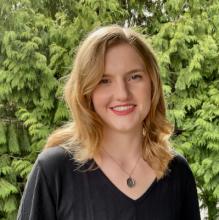Katherine Baillie
Why did you decide to pursue a graduate degree?
I have always been driven by curiosity. During my undergraduate studies in Honours Biochemistry at UBC I was fortunate to have many opportunities to explore research through volunteer, co-operative education, and Honours projects. The potential for discoveries to impact the lives of many through clinical advances drew me towards a career in clinical research. Pursuing graduate studies as an MD/PhD student at UBC will prepare me to be an excellent researcher and clinician and fulfill my goal of translating research findings to patients.
Why did you decide to study at UBC?
UBC provides the best combination of location, program, and opportunities. I have always loved living in the Pacific Northwest, and UBC’s MD/PhD program offers a world-class education in both research and medicine. Working in the BC Cancer Research Institute also brings together a wealth of resources and knowledge and I feel very fortunate to be able to work with my supervisor and colleagues there.
What is it specifically, that your program offers, that attracted you?
The MD/PhD program emphasizes the integration of training in research and medicine. Starting with a foundation of medical training has enabled me to view my research questions through a clinical lens. As I complete my PhD training and return to the clinic, I will be able to use what I learned to identify new research questions as I work with patients to shape my future career.
What was the best surprise about UBC or life in Vancouver?
The sense of community and collaboration. While UBC is a large institution, I have continuously found opportunities to find community both within the medical and graduate programs. I particularly enjoy participating in theatre and music groups such as the annual MedPlay theatre production for charity. In the lab, I am supported by a collaborative network within UBC and internationally that has enabled me to apply new techniques to my work.
What aspect of your graduate program do you enjoy the most or are looking forward to with the greatest curiosity?
Inherent in research is uncertainty. The anticipation during a new experiment and the excitement of novel results pushes me through the tough times. I look forward to discovering what’s next.
What do you see as your biggest challenge(s) in your future career?
There is a certain degree of inertia in making changes to medical practice. As a clinician-scientist, I will advocate for the translation of research findings to patients, which will require funding and a team of support for clinical trials from researchers and clinicians.
How do you feel your program is preparing you for those challenges?
In the MD/PhD program I am building connections with both clinicians and researchers and learning about the challenges faced on both sides. Making meaningful change requires a network of support and having these connections early on will better prepare me to tackle the challenges that are to come.
What aspects of your life or career before now have best prepared you for your UBC graduate program?
Working with a great group of supervisors and mentors. I was very fortunate to receive excellent mentorship, from my first laboratory position, through peer tutoring, co-op, and honours. I have learned invaluable skills from these experiences that I use almost every day in my graduate work.
What advice do you have for new graduate students?
Take time to explore! The start of a project is a great time to try new ideas; be curious and don’t be afraid of ideas that are a little out-of-the-box. It is also a good time to get to know your lab mates, the research facility, and the university. There are so many opportunities out there and knowing what is available to you can open a lot of doors.
